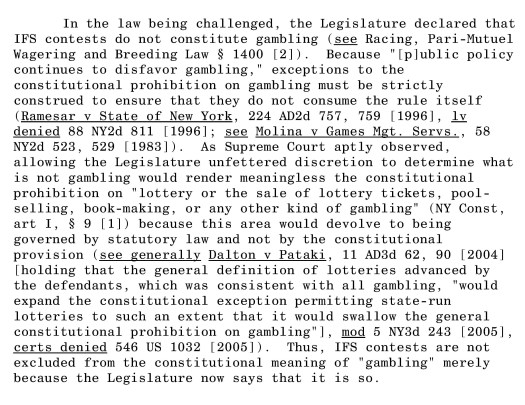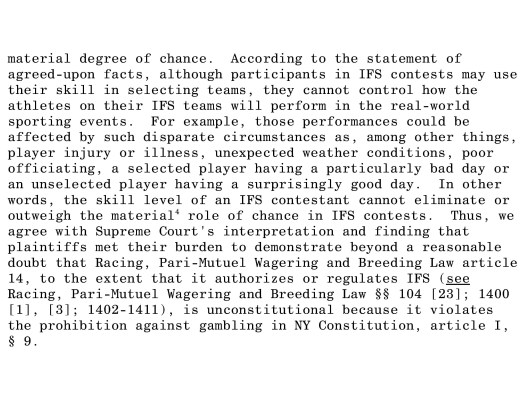Daily fantasy sports may not be long for New York. Article I, § 9 of the New York Constitution bans gambling, plain and simple. That includes, lotteries, pool selling, book making, and “any other form of gambling.” Now, the Appellate Division, Third Department has added DFS to that list of banned games, affirming a trial court judgment that had held that New York’s Interactive Fantasy Sports Law that declared DFS not to be gambling unconstitutional. A copy of the Third Department’s opinion can be read in full here.
The IFS law (Chapter 237 of the Laws of 2016) attempted to exempt “interactive fantasy sports” from the New York Constitution’s ban on gambling. Specifically, it provides:

That was the trick. Although the Constitution does not define what is prohibited as “any other form of gambling,” the Legislature had otherwise provided a definition for the term when the legislation implementing the constitutional ban was enacted in 1965. Penal Law § 225.00 (2) defines “gambling” as “stak[ing] or risk[ing] something of value upon the outcome of a contest of chance or a future contingent event not under his control or influence, upon an agreement or understanding that he will receive something of value in the event of a certain outcome.” A “contest of chance,” in turn, is “any contest, game, gaming scheme or gaming device in which the outcome depends in a material degree upon an element of chance, notwithstanding that skill of the contestants may also be a factor therein” (Penal Law § 225.00 [1]). By declaring that DFS was not a contest of chance or a wager on a future contingent event over which the players have no control and, thus, was not gambling, the Legislature tried to claim that it had the power to authorize the games by mere legislation, rather than following the 2-plus year process to amend the Constitution.
The majority of the Appellate Division, however, wasn’t convinced. Rather, the Court held, the Legislature can’t just declare that DFS isn’t gambling. That’s for the Courts to decide, and allowing the Legislature to simply declare that a game isn’t gambling would render the constitutional ban ineffectual:

The Third Department, thus, held that the Penal Law definition of what is prohibited gambling governs the extent of the constitutional ban. That is, the Constitution prohibits any games that depend upon chance in a material degree, notwithstanding that they may also involve the players’ skill. In so holding, the Third Department rejected the State’s argument that the dominating element test for what is gambling should be applied. Under the State’s reasoning, a game wasn’t gambling if skill predominated any element of chance, and it was gambling if the opposite was true. The dominating element test, the Third Department held, however, was fashioned by the Court of Appeals in evaluating lotteries, not gambling, and was rejected by the Legislature when it defined gambling in the 1965 Penal Law implementing legislation as being based on whether chance is involved to a material degree. The Third Department, thus, held that “the Legislature’s own definition of gambling, as included in the Penal Law since 1965, [w]as the appropriate definition for courts to apply when interpreting that word in the pertinent constitutional provision” (Majority Op, at 7).
Turning to DFS, the Court held that “IFS contestants pay an entry fee (something of value) in hopes of receiving a prize (also something of value) for performing well in an IFS contest” (id. at 7-8). That satisfies two of the elements of the Penal Law definition of gambling. So, whether DFS is prohibited gambling would be determined on whether it involved a material degree of chance. And the Third Department held that it did. Accepting the parties’ stipulation of facts regarding how DFS games work, the Court held

It was as simple as that. Because DFS involves a material degree of chance, the Court held, it is prohibited gambling under the Constitution and cannot be authorized by mere legislation like the IFS Law. The Third Department, thus, affirmed the trial court’s holding that the IFS Law is unconstitutional. But the majority didn’t stop there. It also modified that portion of the trial court judgment that had upheld the IFS Law’s provisions decriminalizing DFS games. Although the Court held that the Legislature had to power to decriminalize DFS, it could not sever the provision from the rest of the IFS Law and, thus, declared it unconstitutional as well.
Justice Stan Pritzker dissented, arguing that the majority went well beyond the appropriate standard of review in this constitutional challenge to the IFS Law. As Justice Pritzker saw it, the Court’s task was to limited to “deciding whether the Legislature rationally determined, after hearing and considering evidence, that IFS contests are not ‘gambling’ as defined under Penal Law § 225.00” (Dissenting Op, at 12). Because ample evidence existed in the legislative record for that determination, Justice Pritzker would have upheld the IFS Law because the Plaintiffs did not meet their initial burden to show that the law was unconstitutional beyond a reasonable doubt.
Indeed, Justice Pritzker reasoned, “the Legislature’s judgment necessarily involved determining whether an IFS contest is a ‘game of chance’ and, as such, analyzing whether the degree of chance is ‘material’ in determining the outcome of an IFS contest. Because it is not seriously disputed that an IFS contest involves a high degree of skill, as was found by Supreme Court, then determining whether the degree of chance inherent in an IFS contest is ‘material’ presented a difficult and nuanced question for the Legislature. And, although it may have been rational to determine that the amount of chance in an IFS contest is material, as did some of the legislators who voted against the bill, it was not at all unreasonable, based upon the legislative record, to conclude otherwise. The difference is that the legislation bears the imprimatur and presumption of constitutionality and, thus, summary judgment should not have been granted in favor of plaintiffs” (Dissenting Op, at 16-17). Furthermore, Justice Pritzker would have held, “Supreme Court incorrectly focused on the fact that the participants do not have actual influence over the athletes. However, this notion was debated by the Legislature and it ultimately concluded that the proper focus is not on the participants’ influence over the real world events and a specific athlete’s performance, but the participants’ unquestionable influence on winning the contest by making skillful choices in assembling a fantasy roster. Indeed, the plethora of evidence that was rationally relied upon by the Legislature in finding that IFS contests are predominantly contests of skill – a finding that Supreme Court accepted – also supports the notion that IFS contestants meaningfully, using certain parameters such as data and salary cap management, influence the outcome of the contests” (id. at 19). Thus, because the Legislature rationally decided that skill predominates over chance in DFS games, Justice Pritzker would have declared that the IFS Law did not violate the New York Constitution’s ban on gambling.
From here, the State will undoubtedly appeal the Third Department’s ruling as of right to the Court of Appeals. Although few jurisdictional predicates exist for as of right appeals to the Court of Appeals, this case satisfies one because the decision directly involves a substantial constitutional question. Once the State serves the notice of appeal, it also gets the benefit of an automatic stay under CPLR 5519 (a) (1), which should preserve the status quo and allow DFS games to continue while the State pursues its appeal. Although not much will change in the near future, the long term viability of DFS in New York is very much in flux.
Within a year or so, we should know once and for all whether DFS games are prohibited gambling banned by the Constitution, or whether the Legislature can rationally decide that they are not gambling and can be authorized by a mere legislative enactment. It’s now up to the seven Judges of the Court of Appeals to make that call.

4 Replies to “New York Daily Fantasy Sports Suit: Appellate Division, Third Department Holds the Entire Interactive Fantasy Sports Law Unconstitutional”